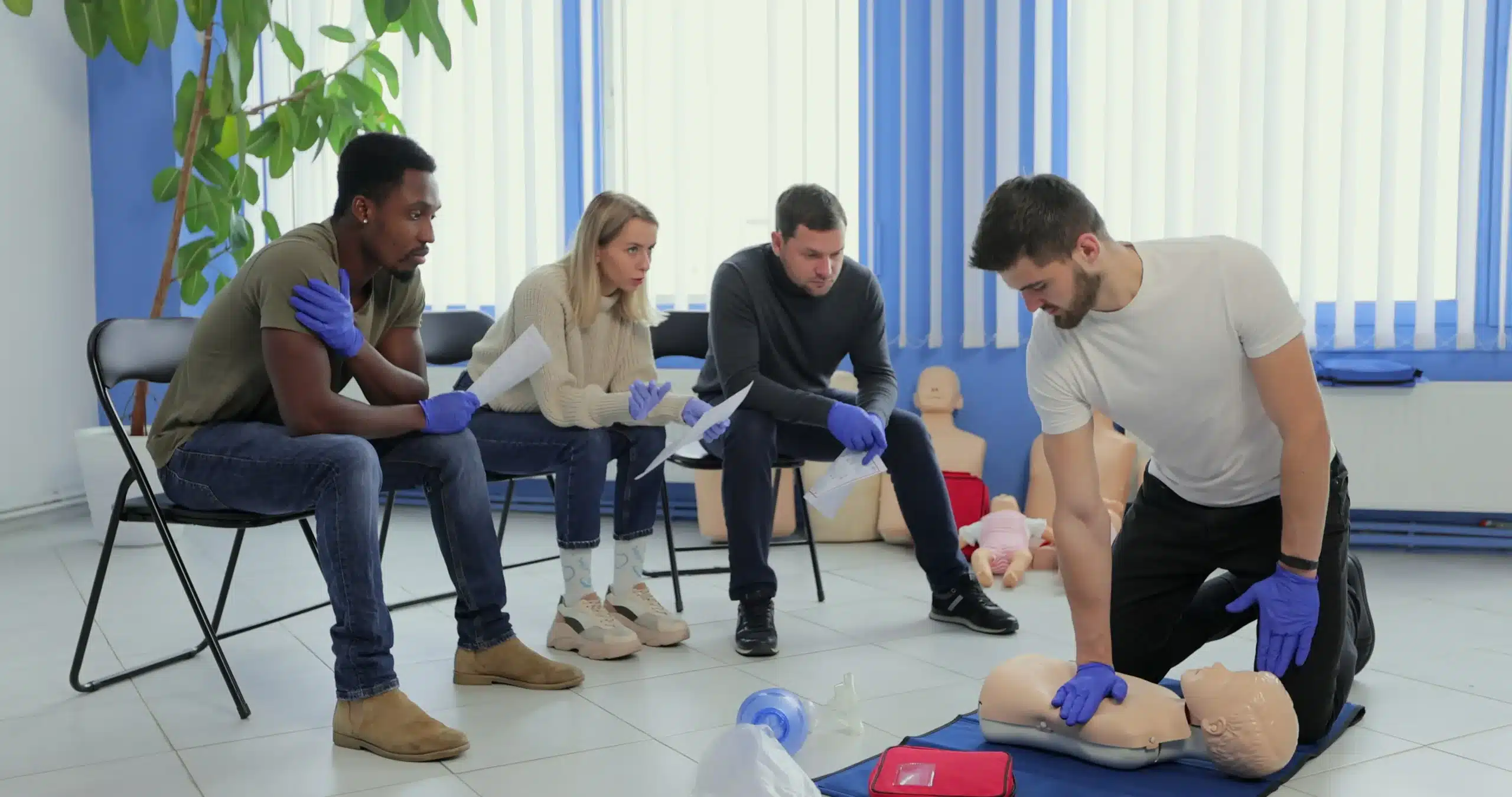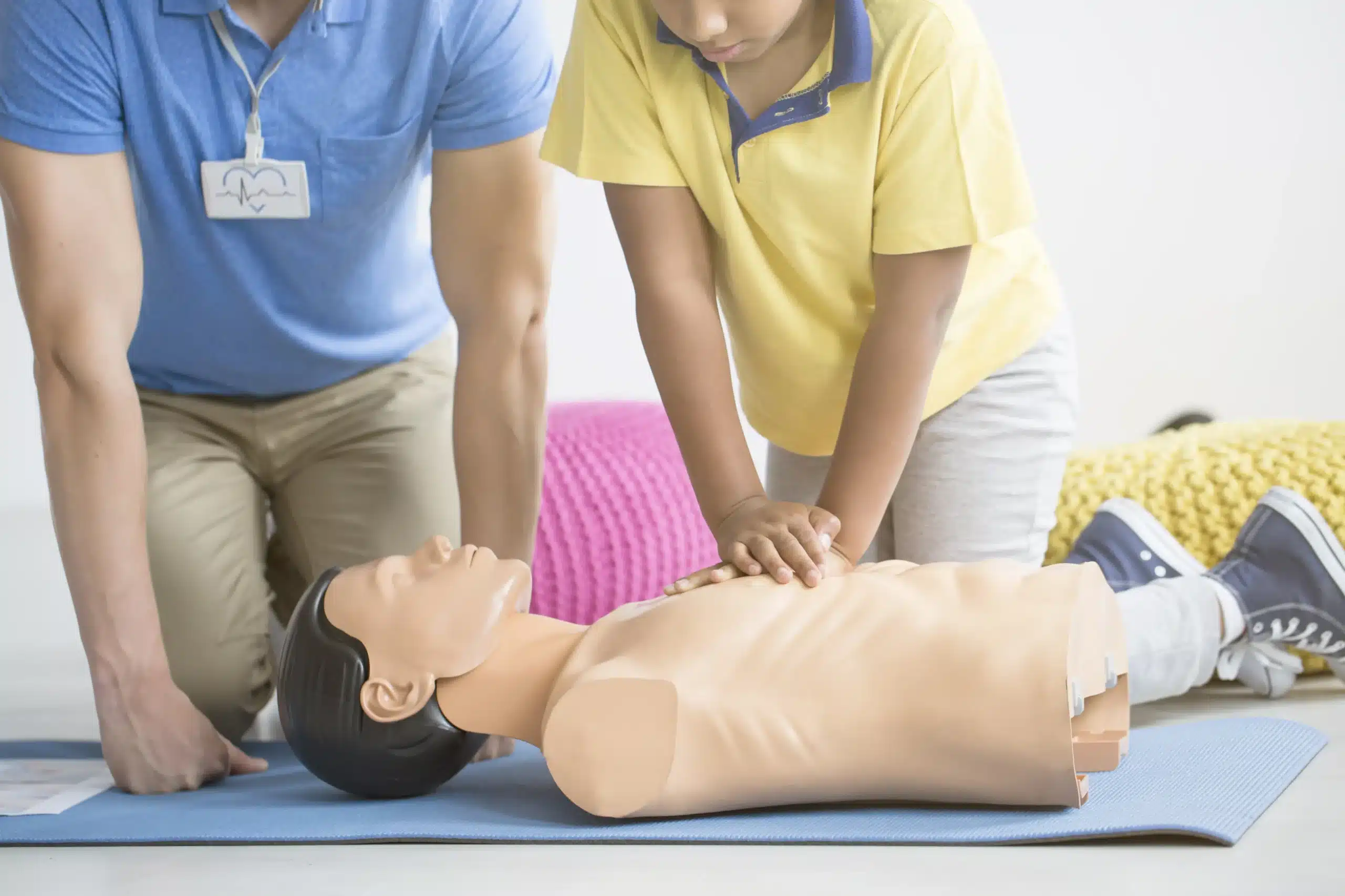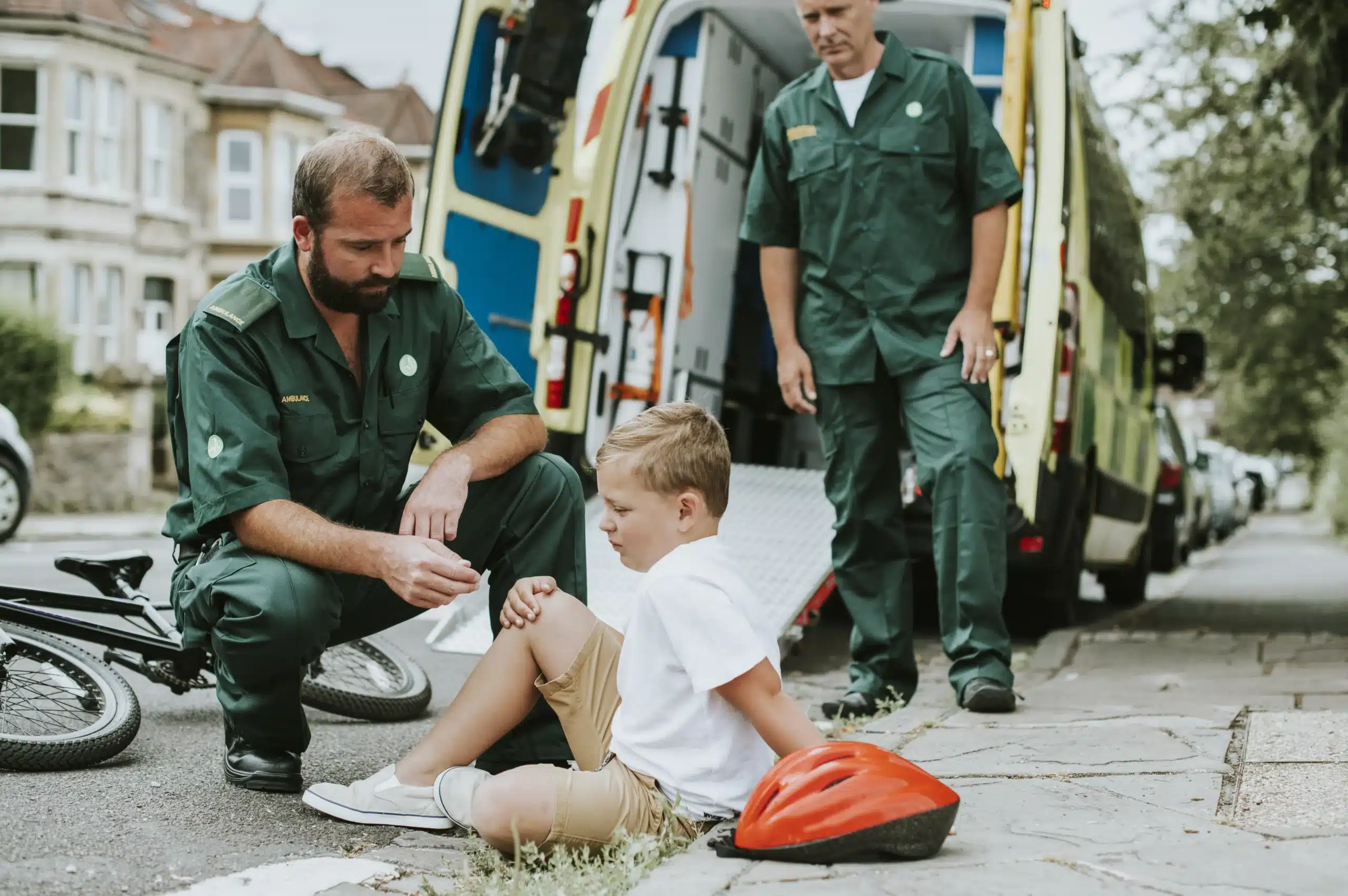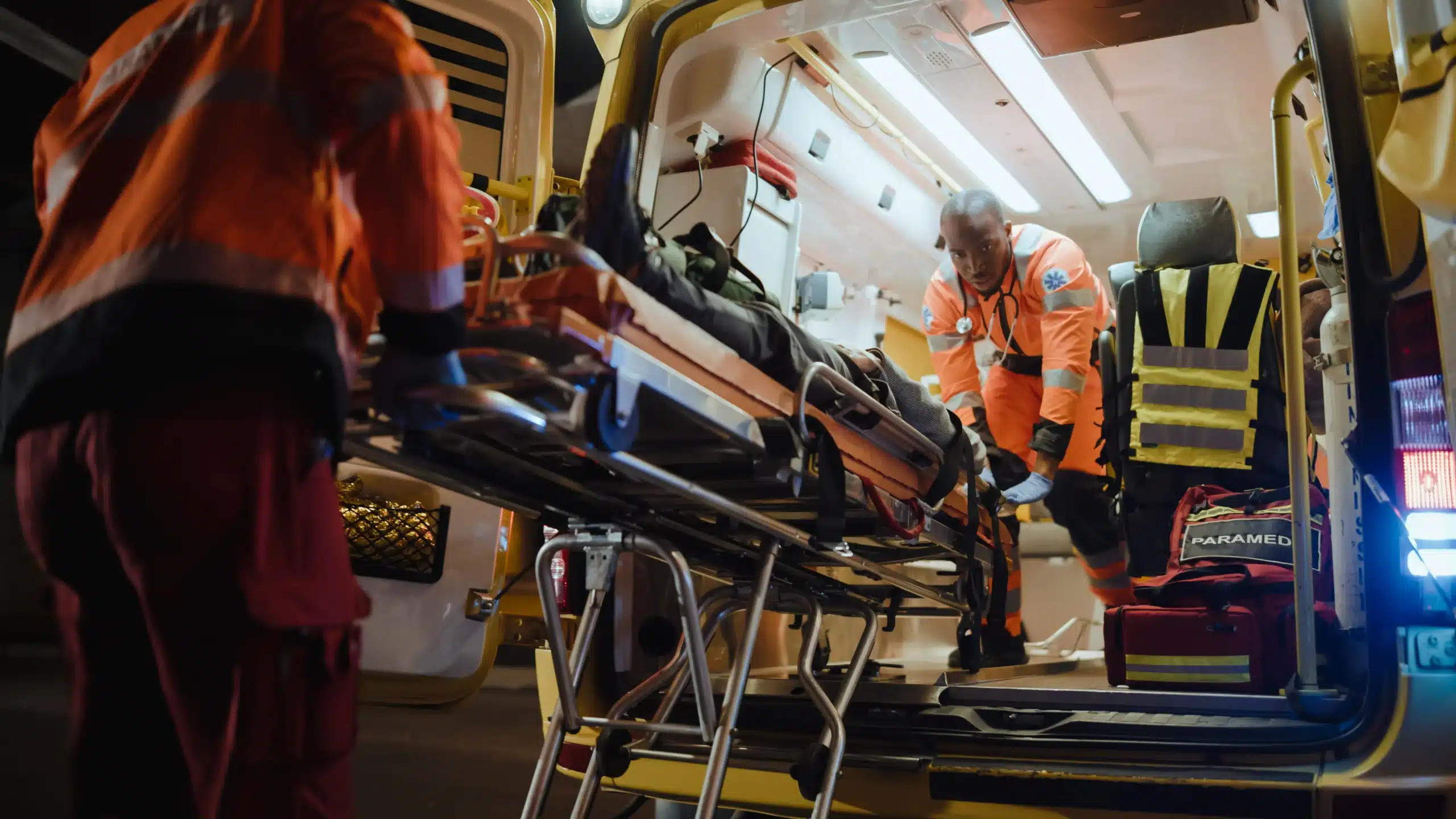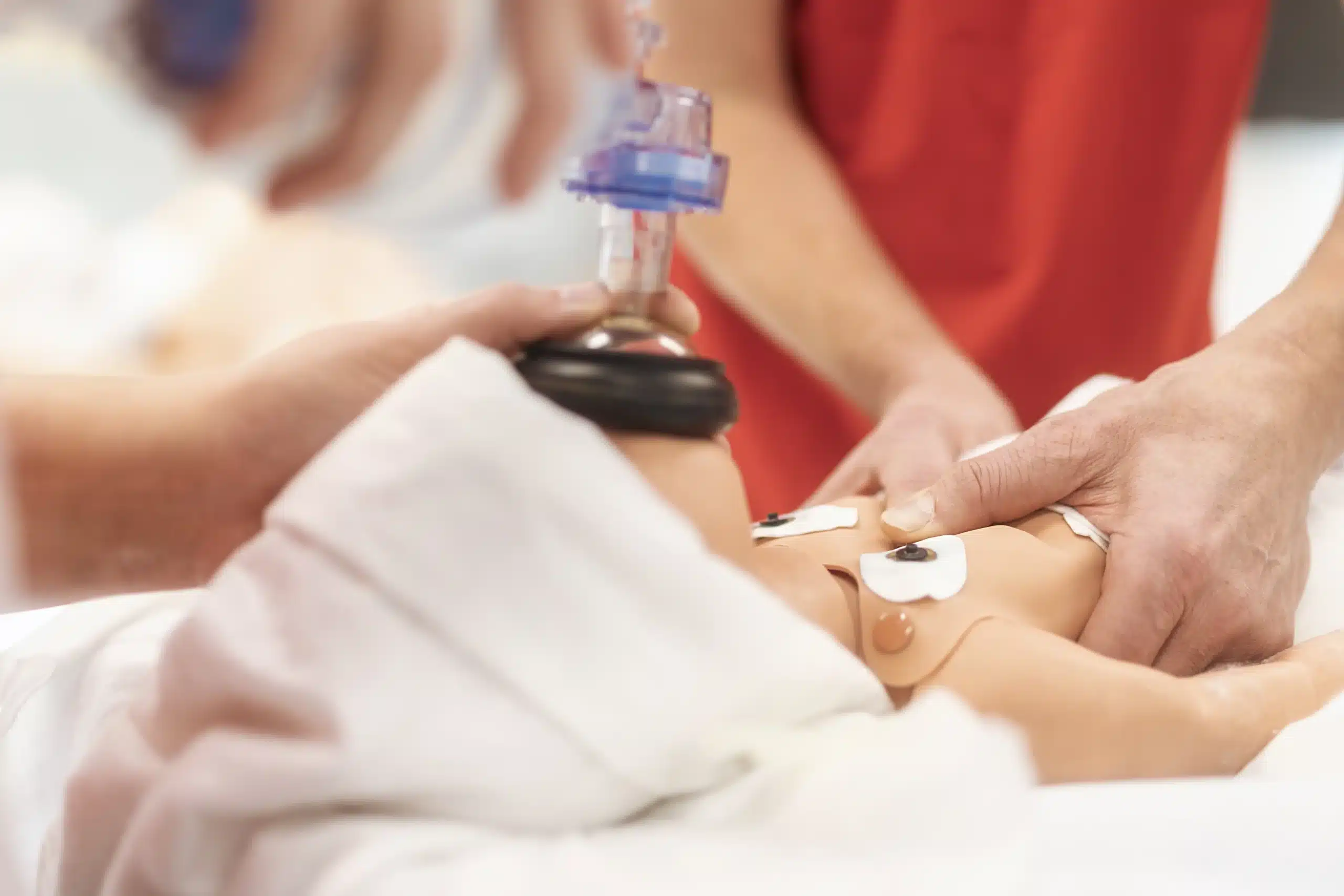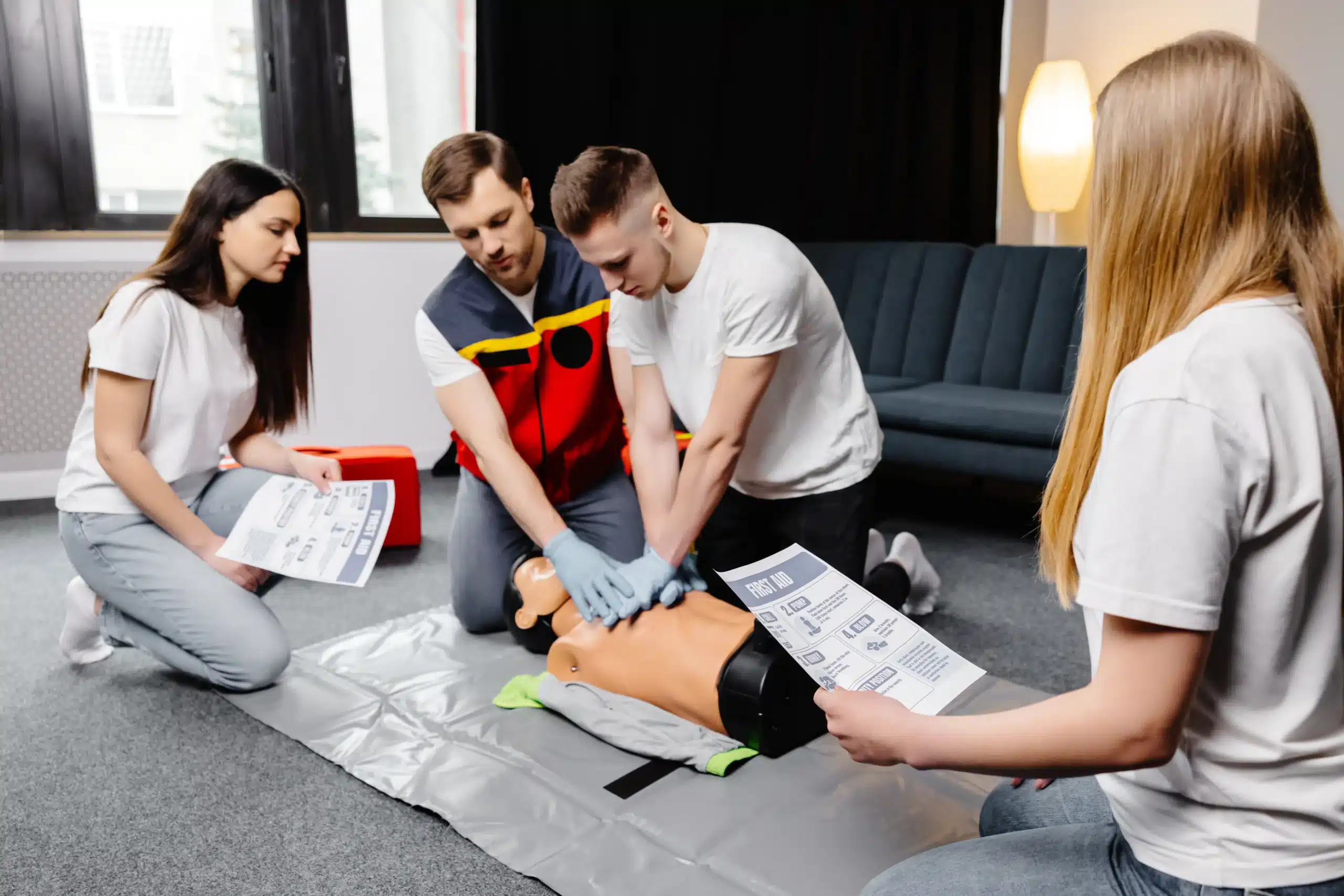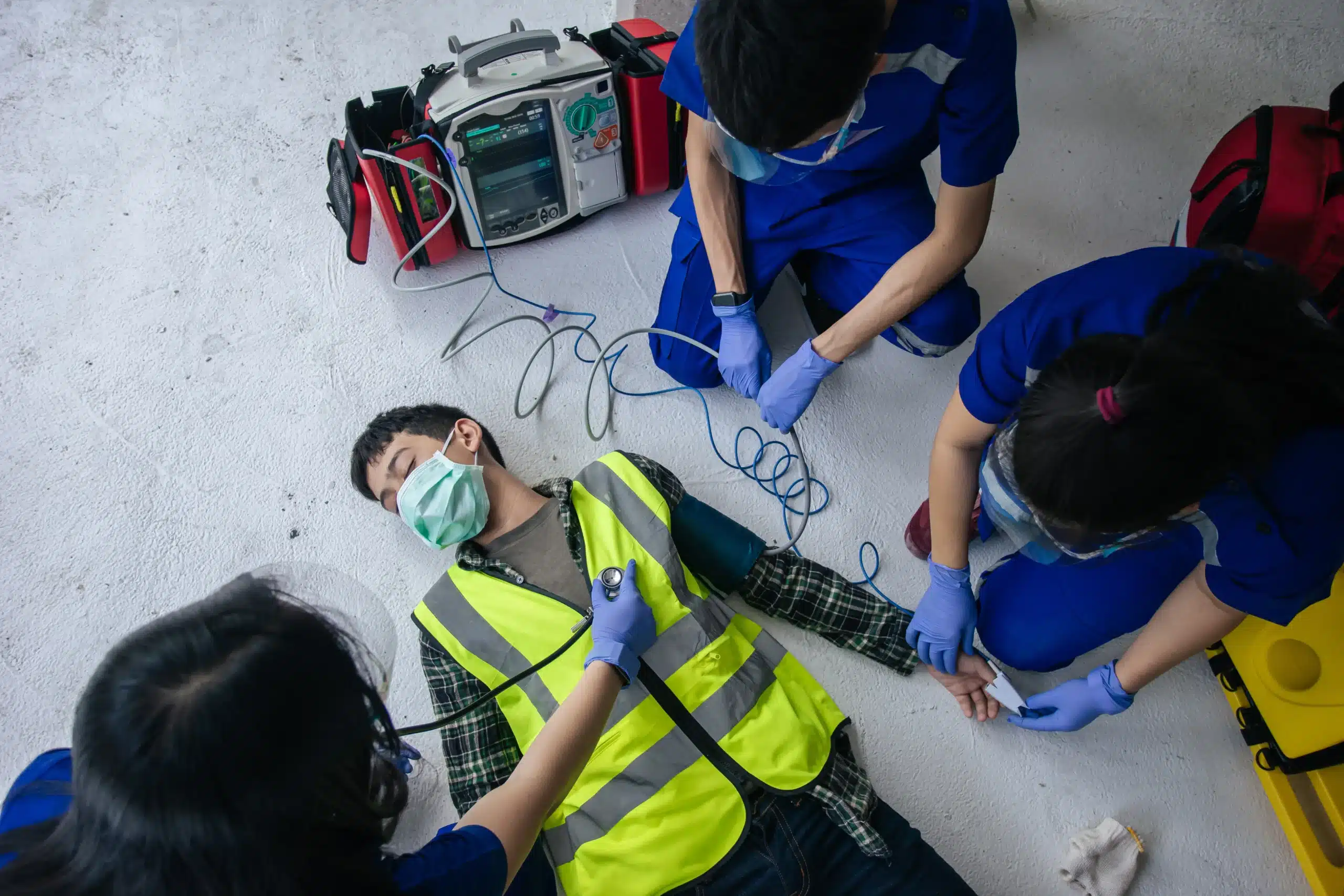Empowering yourself with life-saving skills is one of the most valuable things you can do, both for yourself and your community. CPR classes in San Jose offer a pathway to that empowerment, providing comprehensive training in essential life support techniques. This guide will explore the world of CPR certification in San Jose, covering everything from the basics of CPR to the different certification levels and how to choose the right class for your needs. We’ll also delve into the process of getting certified, what to expect during your class, and the resources available to help you succeed.
Key Takeaways
- CPR skills empower everyone: Learning CPR, whether for personal preparedness or professional requirements, equips you to confidently handle medical emergencies and potentially save lives. Explore options ranging from basic CPR/First Aid to specialized certifications like BLS and ACLS.
- Different CPR certifications suit different needs: Parents, caregivers, and those seeking general knowledge benefit from combined CPR/First Aid courses. Healthcare professionals often require BLS or ACLS for career advancement and to meet workplace standards. Choose the certification that aligns with your goals.
- Affordable and accessible training is readily available: Providers like Morgan Hill CPR Classes offer various certifications, flexible schedules, and competitive pricing, making high-quality CPR training accessible to everyone in the San Jose area and beyond. Consider group discounts for workplace training or community learning.
What is CPR? San Jose Edition
Cardiopulmonary resuscitation (CPR) is a life-saving technique used when someone’s breathing or heartbeat has stopped. It combines chest compressions and rescue breaths to circulate oxygenated blood to vital organs, buying precious time until professional medical help arrives. Learning CPR empowers you to respond effectively during cardiac arrest and dramatically increases the victim’s chance of survival.
Knowing CPR is especially valuable in a bustling city like San Jose. Studies show that prompt and effective bystander CPR can double or even triple a victim’s survival rate. By becoming CPR certified, you’ll have the skills and confidence to act quickly in emergencies, potentially saving lives within your community and beyond. Organizations like the American Heart Association and the Red Cross offer a range of CPR training programs throughout the San Jose area. These programs provide high-quality instruction and certification, typically covering adult, child, and infant CPR, along with training on how to use an Automated External Defibrillator (AED). For convenient CPR classes near San Jose, consider checking out Morgan Hill CPR Classes, which serves the broader region.
CPR Certifications: Which One Do You Need?
Choosing the right CPR certification depends on your specific needs and career goals. Let’s break down the most common types of CPR certifications and who they’re best suited for.
BLS
Basic Life Support (BLS) certification is designed for healthcare providers, such as doctors, nurses, paramedics, and other professionals working in medical settings. This course equips you with the fundamental skills to respond to life-threatening emergencies, including performing high-quality CPR, using an AED, and working effectively as a team during resuscitation. BLS certification typically takes a few hours to complete and is essential for anyone in the healthcare field.
ACLS
Advanced Cardiovascular Life Support (ACLS) certification builds upon the foundational skills learned in BLS. It’s tailored for healthcare professionals who lead or participate in managing cardiopulmonary emergencies. ACLS training covers advanced interventions, including administering medications and managing airways, making it crucial for physicians, nurses, paramedics, and other advanced healthcare providers. If you’re already BLS certified and want to enhance your emergency cardiovascular care skills, ACLS is a good next step.
PALS
Pediatric Advanced Life Support (PALS) certification focuses on providing emergency care for infants and children. This specialized training is essential for healthcare providers working in pediatrics, including doctors, nurses, and paramedics. PALS equips you with the knowledge and skills to effectively manage life-threatening situations in young patients.
CPR/First Aid
Even if you’re not a healthcare professional, learning CPR and first aid is invaluable. These combined courses cover basic life-saving techniques, including CPR, AED use, and how to respond to common injuries like cuts, burns, and choking. CPR and first aid certification is a great option for anyone who wants to be prepared for emergencies, whether at home, in the workplace, or out in the community.
CPR Class Costs & Discounts
CPR certification courses in San Jose come with varying price tags. The cost often depends on the provider, the course format (online, in-person, or blended learning), and included materials. A basic CPR course might take a few hours, while more advanced certifications like ACLS require longer training, impacting the overall cost. It’s always a good idea to compare pricing and course content before committing to a specific class.
Average Costs
Expect a range of prices for CPR classes in San Jose. Basic CPR and First Aid certification can start around $70, while more comprehensive courses like BLS for healthcare providers may cost between $80 and $100. Remember that these are estimates, and prices can vary. Always check with the specific provider for their most up-to-date pricing. Understanding the different certification levels and their associated costs will help you choose the right course for your needs.
Group Discounts & Promotions
Training with a group? Look for group discounts. Many providers, including Morgan Hill CPR Classes, offer reduced rates for group bookings. Check our group discount page for more information on how to save money when registering as a group. This can be a smart option for businesses certifying their employees or for community groups learning CPR together.
Low Price Guarantees
At Morgan Hill CPR Classes, we believe that life-saving skills should be accessible to everyone. We offer a low-price guarantee, ensuring you receive high-quality training at a competitive price. We’re committed to providing affordable and convenient CPR classes in Morgan Hill, San Jose, and Gilroy. We also offer flexible scheduling options, including weekend and evening classes.
Find CPR Classes in San Jose
Finding the right CPR class in San Jose depends on several factors, including your schedule, preferred learning style, and budget. Let’s break down how to find the perfect fit.
Training Centers & Locations
San Jose has numerous CPR training centers offering various certifications. Safety Training Seminars, for example, provides a range of CPR courses with daily classes and readily available customer support. A quick online search for “CPR classes near me” can also help you locate training centers in your specific area, whether you’re closer to downtown, Willow Glen, or another neighborhood. Consider factors like proximity to your home or work when choosing a location.
Class Schedules & Flexibility
Balancing work, family, and other commitments can make finding time for a CPR class challenging. Look for training centers that offer flexible scheduling options, such as weekend or evening courses, or accelerated programs. CPR certification in San Jose often comes with various scheduling options, including combined CPR and first-aid classes to help you get certified efficiently.
Online vs. In-Person
CPR classes are available in several formats: online, in-person, and blended learning (a combination of both). Online courses offer convenience and flexibility, allowing you to learn at your own pace. In-person classes provide hands-on practice and direct interaction with instructors. Blended learning combines the benefits of both. BLS certification in San Jose often varies in price depending on the format and included materials. Consider your learning style and budget when deciding which format is best.
On-Site Training
For larger groups or businesses, on-site training can be a convenient and cost-effective option. Some providers, like In Home CPR, bring the CPR class directly to your San Jose business or home. This eliminates the need for individual travel and allows for a tailored training experience.
Get Certified: Process & Requirements
Getting CPR certified is straightforward, but understanding the requirements and how to maintain your certification is key. This section covers everything you need to know about certification duration, renewal, and prerequisites for more advanced courses.
Certification Duration
CPR certifications are typically valid for two years. This standard applies to most certifications, including BLS, ACLS, PALS, and CPR/First Aid. After two years, you’ll need to renew your certification to stay current with the latest guidelines and maintain your skills. This two-year timeframe ensures rescuers stay up-to-date on best practices and can provide effective assistance during emergencies. Check with your certifying organization or training center for specific requirements.
Renew Your Certification
Renewal courses refresh your knowledge and skills. You can usually take a renewal course up to 30 days before your certification expires, or sometimes within a short grace period afterward. Renewal courses are often shorter than the initial certification course, saving you time and effort.
Prerequisites for Advanced Classes
Advanced courses like ACLS and PALS often have prerequisites. These courses are designed for healthcare providers such as physicians, nurses, paramedics, and respiratory therapists. While a current BLS (CPR) certification isn’t always mandatory, it’s highly recommended. A solid foundation in basic life support significantly enhances your understanding and performance in these advanced courses. You should be proficient in providing BLS care, including prioritizing chest compressions and using an AED. For more details, review the requirements on our ACLS and BLS course pages. Some programs, like UCLA’s PALS course, also require demonstrating specific skills before enrollment.
Your CPR Class: What to Expect
Walking into a CPR class for the first time can feel a little like the first day of school—a mix of excitement and maybe a few nerves. To help you feel prepared and confident, let’s break down what a typical CPR class at Morgan Hill CPR Classes looks like.
Class Structure & Duration
CPR classes blend theory and hands-on practice. You’ll start with the basics: understanding how CPR works, why it’s important, and the steps involved. Then, you’ll move into practicing those skills. A basic CPR class might take a few hours, while more advanced certifications like BLS or ACLS require longer training. For more details on specific class lengths, check out our course preparation page.
Hands-on Practice & Equipment
This is where things get real (but in a safe and controlled environment!). You’ll work with training manikins to practice chest compressions, rescue breaths, and other essential techniques. For example, BLS certification provides essential life-saving skills, teaching you CPR, AED use, and airway management techniques so you can confidently respond to emergencies. Our instructors guide you through each step, providing feedback and ensuring you develop the muscle memory and confidence to perform CPR effectively.
Exams: Written & Practical
Most CPR certifications involve both a written exam and a practical skills test. The written portion assesses your understanding of the concepts covered in the course, while the practical exam evaluates your ability to perform CPR correctly. Don’t worry, our instructors will prepare you thoroughly for both. Reviewing the course materials beforehand can definitely help.
Expert Instructors & Training Quality
At Morgan Hill CPR Classes, our instructors are experienced healthcare professionals dedicated to providing high-quality training. They create a supportive learning environment where you can ask questions, practice your skills, and feel comfortable throughout the process. As a woman-owned AHA Training Center, we’re committed to empowering our community with these life-saving skills. We offer daily CPR classes in over 60 cities and even have a low-price guarantee.
Prepare for Your CPR Class
Getting ready for your CPR class doesn’t have to be stressful. A little preparation goes a long way toward a smooth and successful learning experience. Here’s what you need to know:
Required Materials
Most CPR classes provide the essential materials, including mannequins and training equipment. However, it’s always a good idea to confirm with your chosen training center. Some classes may suggest bringing a notebook and pen to jot down notes, while others might offer printed handouts. For specifics on what to expect at Morgan Hill CPR Classes, check our course preparation page.
Pre-Course Resources
Before your class, take some time to think about your certification goals. Are you pursuing general CPR knowledge, or are you aiming for a specific certification like BLS? Understanding your needs will help you choose the right course. Explore our CPR certification guide for more information about different certification levels.
What to Wear & Bring
Comfort is key during your CPR class. Wear loose, comfortable clothing that allows for a full range of motion. You’ll be practicing techniques that require kneeling and bending, so avoid restrictive outfits. A small notebook and pen might be helpful for taking notes, but double-check with Morgan Hill CPR Classes, as we often provide materials. You can find additional tips on our San Jose CPR classes guide.
Why Take a CPR Class in San Jose?
Knowing CPR can make a real difference in critical situations. Whether you’re a healthcare professional, a parent, or simply someone who wants to be prepared, there are plenty of compelling reasons to get CPR certified in San Jose.
Life-Saving Skills & Confidence
CPR certification equips you with the skills to respond effectively during medical emergencies. You’ll learn essential techniques like chest compressions, rescue breaths, and how to use an AED. These skills empower you to act quickly and confidently if someone experiences cardiac arrest or another life-threatening event. Having this knowledge can dramatically increase the chances of survival for someone in need. You can find more information on BLS Certification in San Jose.
Career Advancement
For those in or aspiring to be in the healthcare field, CPR certification is often a prerequisite. Many hospitals and medical centers in San Jose prefer or require BLS certification, a specialized type of CPR training designed for healthcare providers. Earning your BLS certification can open doors to more job opportunities and enhance your resume, demonstrating your commitment to patient care and safety. It can also be a stepping stone to more advanced certifications like ACLS and PALS. Learn more on our ACLS page.
Meet Employer Requirements
Even outside of healthcare, many employers require or encourage CPR certification for their employees. This is especially true for jobs involving childcare, education, fitness, or any role where you might be responsible for the safety of others. Knowing CPR can create a safer work environment and shows your employer that you’re prepared to handle emergencies. Depending on your specific job, you might need BLS, CPR/First Aid, ACLS, or PALS certification. For example, childcare providers in California need certification in Pediatric First Aid, AED, and CPR. Review our CPR class preparation page to learn more about certification options and requirements. Understanding these requirements will help you choose the right course.
Choose the Right CPR Class
Knowing which CPR class is right for you can feel overwhelming with so many options. This guide will simplify the process and help you make the best choice. We’ll cover the key certifications and who they best suit.
For Healthcare Professionals
Healthcare providers, like doctors, nurses, and EMTs, work in fast-paced environments requiring advanced life support skills. For these professionals, a Basic Life Support (BLS) certification is essential. BLS training focuses on high-quality CPR, using a team approach, and other critical skills for medical emergencies. It goes beyond the basics, equipping you with the tools to effectively respond to cardiac arrest and other life-threatening situations in medical settings. This specialized training is often a job requirement for many healthcare roles.
For Parents & Caregivers
If you’re a parent, grandparent, babysitter, or anyone who cares for children, a Pediatric First Aid AED CPR class is a smart choice. This course covers CPR and first aid techniques specifically designed for infants and children. It also includes training on how to use an automated external defibrillator (AED). Having these skills can bring invaluable peace of mind. In California, this certification is often required for licensed daycare providers and preschool teachers. Check with your local licensing board for requirements in your area.
For the Public & Workplace Safety
For most people and general workplace settings, a standard CPR and First Aid class is a great option. These classes teach the fundamentals of CPR for adults, children, and infants and cover common first aid scenarios like burns, cuts, and allergic reactions. Combined CPR and first-aid training offers well-rounded knowledge and skills to handle various emergencies. Many workplaces encourage or require this type of training to ensure a safe environment. Check with your employer to see what certifications they recommend or require. Look for training centers like Morgan Hill CPR Classes that offer flexible scheduling and a variety of certification options to fit your needs.
CPR Training Providers in San Jose
Finding the right CPR class can feel overwhelming, but with so many excellent options in San Jose, you’re sure to find one that fits your needs. Here’s a rundown of some reputable training providers:
Morgan Hill CPR Classes
Morgan Hill CPR Classes offers various American Heart Association certifications, including BLS, ACLS, PALS, CPR, and First Aid. As a woman-owned business, they pride themselves on their low-price guarantee and convenient daily classes in over 60 cities. They serve Morgan Hill, San Jose, and Gilroy, making them an accessible choice for many in the South Bay Area. For more details, explore their BLS and ACLS certification options. Looking to train a group? They offer group discounts. Before your class, take a look at their course prep page.
American Red Cross
The American Red Cross is a well-known provider of CPR classes in San Jose, offering training for everyone from the general public to healthcare providers. Their established reputation and wide range of courses make them a reliable option.
American Heart Association Training Centers
Several American Heart Association Training Centers operate in San Jose, providing high-quality instruction and certification in essential lifesaving skills. Safety Training Seminars is one example, offering courses such as BLS, ACLS, PALS, CPR, and First Aid. They provide daily classes and dedicated customer service.
Local Hospitals & Community Centers
Many local hospitals and community centers offer CPR certification courses. These classes are often tailored to the specific needs of the community and provide convenient, affordable training options. Check with your local hospital or community center for information on their programs.
Fan of CPR
Fan of CPR comes highly recommended by many, known for their well-structured courses and knowledgeable instructors. They offer a positive learning experience for those wanting to develop these crucial skills.
CPR Training Center
Safety Training Seminars also operates as a CPR Training Center, offering various in-person CPR and First Aid courses in San Jose. Their focus on accessibility makes it easier for individuals to access the training they need.
San Jose CPR Certification
Safety Training Seminars is a key provider of American Heart Association (AHA) courses in San Jose, with a focus on convenient daily classes for both healthcare professionals and the general public. They offer a streamlined approach to certification.
Related Articles
- CPR Certification in San Jose: A Complete Guide
- HeartCode BLS San Jose: A Certification Guide
- BLS Renewal San Jose: Your Easy Guide – Morgan Hill CPR Classes
- Course Preparation – Morgan Hill CPR Classes
- CPR Classes in Morgan Hill: Your Complete Guide – Morgan Hill CPR Classes
Frequently Asked Questions
Which CPR certification is right for me?
It depends on your situation. If you’re a healthcare professional, BLS is likely required. Parents and caregivers should consider a Pediatric First Aid AED CPR class. For general knowledge and workplace requirements, a standard CPR/First Aid course is a good choice. The blog post goes into more detail about each certification, so you can compare and choose the best fit.
How much do CPR classes cost in San Jose?
Costs vary depending on the provider, the type of certification, and the course format (online, in-person, or blended). Basic CPR/First Aid courses tend to be less expensive than specialized certifications like BLS or ACLS. Check with specific providers like Morgan Hill CPR Classes for their pricing, and don’t forget to ask about group discounts!
What can I expect during a CPR class?
CPR classes typically involve a mix of learning the theory behind CPR and getting hands-on practice with training manikins. You’ll learn the steps of CPR, how to use an AED, and what to do in various emergency scenarios. Most classes include both a written exam and a practical skills test.
How long is a CPR certification valid, and how do I renew it?
Most CPR certifications are valid for two years. To renew, you’ll need to take a recertification course before your current certification expires. These renewal courses are often shorter than the initial certification class.
How do I find CPR classes near me in San Jose?
An online search for “CPR classes near me” is a great starting point. The blog post also lists several reputable training providers in the San Jose area, including Morgan Hill CPR Classes, the American Red Cross, and others. Consider factors like location, schedule, and cost when making your decision.
